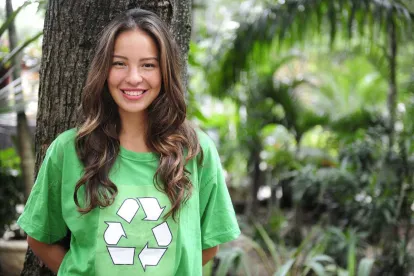Americans have been “recycling” since colonial times. However, it wasn’t until the 1960s that Americans began viewing recycling ― often provided alongside rubbish removal ― a more formal solution to problems posed by consumer waste. Consumers blue-bagging newspapers, cereal boxes, and empty beer cans could not provide a full solution to the problem of waste.
The 1970s saw the popularization of the 3 R’s campaign: “Reduce, Reuse, Recycle.” This shift in emphasis from, “do what you want, but recycle if you can” to individuals having a broader obligation to minimize product waste might be a small step, but one that has been mirrored in broader culture ever since.
The second part of our multi-part series on the developing field of environmental, social, and governance (ESG) litigation focuses on claims related to product sustainability and the broader pattern of “circular economy.” ESG reporting has imposed a similar burden of waste minimization on businesses through an often statistical focus on organizations’ waste-related impacts, waste prevention, and “circularity” of the product cycle. Below, we examine how wastes are regulated under environmental laws and discuss why companies are likely to be faced with civil litigation related to waste in the ESG space as part of broader campaigns to force environmental policy changes.
“Circular Economies” and the Historic Regulation of Waste
Traditionally, the US government did not regulate waste, except through tort theories of liability like trespass and nuisance. It wasn’t until the late 1970s that the major waste statutes and regulations on waste took shape. Even then, the primary federal waste-focused statutes dealt and continue to deal only with defined types of waste, such as “hazardous substances” listed under the Comprehensive Environmental Response, Compensation, and Liability Act (CERCLA), and certain kinds of waste management units ― or wastes that “may pose imminent and substantial endangerment” under the Resource Conservation and Recovery Act (RCRA). (Litigation under these statutes has long provided fodder for our blogging efforts, see here, here, and here for some examples of issues arising under these statutes.)
Importantly, no federal waste-focused laws are particularly concentrated on consumer goods waste or push businesses toward “sustainability” or a more “circular economy,” meaning an economy that keeps products and materials in circulation and away from landfills and the reliance on raw materials and single-use products. To fill the void, several states have started to regulate waste at the consumer goods level by imposing “circular economy” directives on businesses. For example, state or local bans on single-use plastic bags are active in California, Massachusetts, Colorado, New York, and Illinois, which have banned single-use plastic bags at large retail stores. But even these states and localities are not legislating fast enough on these issues for certain people, and some groups are turning to tort-based litigation to force changes in corporate behavior across the board, regardless of the jurisdiction in which a business operates.
Trends in Sustainability and ESG-Focused Litigation
Claims against companies related to “sustainability” have proliferated over the years (see here and here), and ESG reporting will likely shine a light on waste-related practices by imposing reporting obligations. (See here for further discussion.) Corporate disclosures related to waste-related practices will likely provide fodder for circular economy-focused litigation. As we discussed in relation to carbon-intensive industries, novel legal theories often end up being deployed against businesses perceived in some quarters as being under-regulated under more traditional regulations.
These types of lawsuits generally seek to hold businesses accountable for their waste-related impacts and to compel changes in corporate practices. Plaintiffs range from federal, state, and local governments to consumers, non-governmental organizations (NGOs), and even company shareholders. No matter the type of plaintiff, recent circular economy-focused litigation has generally fallen into two main categories.
Waste-Related Lawsuits. Circular economy-based litigation challenging corporate waste impacts are on the rise. Use of ESG-related theories often occurs hand-in-hand with use of “public nuisance” tort theories, something we discussed here. Plaintiffs have challenged sustainability goals selected by companies themselves and sought to impose external ESG principles to corporate practices. As we previously blogged, the City of Baltimore has sued various cigarette manufacturers to recoup the costs associated with cleaning up cigarette filter litter, damages to natural resources, and decrease in property values allegedly caused by the dumped filters. The complaint alleges that the manufacturers violated state and local pollution laws and committed various torts by designing the filtered cigarettes in a manner that was unsafe for the environment. The lawsuit is an example of a municipal plaintiff imposing its own ESG principles on a corporate actor.
Product Attribute Lawsuits. In contrast to the waste-related lawsuits, which tend to focus on a companies’ big-picture policies and/or actions, product attribute lawsuits tend to focus on claims regarding particular products. For example:
-
Product Recyclability. Last week, consumers sued The Glad Products Company and Clorox Company alleging that the companies falsely labeled and advertised their trash bags as “recyclable” and “designed for municipal use” in part because “no municipalities allow the bags, which end up in landfills or incinerators.” The consumers seek injunctive and monetary relief. This case is similar to other lawsuits that have been brought in recent years, including a California federal case of Smith v. Keurig Green Mountain, Inc., alleging that Keurig wrongfully labeled its Keurig pods as “recyclable”.
-
Greenwashing. Dwyer v. Allbirds, Inc., is another recent example of ESG-focused litigation targeting corporate statements on environmental impacts. As we previously discussed in 2021, this consumer class action lawsuit was filed against the clothing company Allbirds and alleged that the company made misleading marketing statements, including ones regarding the welfare of the sheep from which Allbirds sourced its wool. Ultimately, the court dismissed this suit, but these types of claims continue to be brought against businesses at a rapid pace.
-
Product Biodegradability. In 2021, a shareholder brought a stockholder derivative action against members of the board of directors and upper management of Danimer Scientific, Inc., a bioplastics company. The lawsuit alleges that Danimer and its directors made inaccurate statements about the biodegradability of its product, Nodax, and failed to disclose environmental compliance issues to shareholders. The action further alleges that these false statements lead to the artificial inflation of the company’s value, from which the directors made a profit.
We expect these lawsuits ― and others pressing for a corporate shift towards a more circular economy ― to continue.
Litigation Avoidance in This Context
While we expect companies will continue to make ESG-related transparency a priority, companies can also consider taking various steps to minimize the risk of circular economy-focused litigation:
-
Be deliberate when making public statements related to regarding circular economy issues and sustainability attributes related to products and the processes under which they are made. Secure the advice of counsel related to these products and product disclosures. Stay current on ESG-related litigation trends to better inform the review of company statements and claims related to circular economy issues.
-
Review all current “recyclability” and other product attribute statements. Any review should include on-product packaging and labeling as well as other marketing statements made in advertising, social media, and as part of a product’s overall branding. Statements should be reviewed to ensure that they are verifiable and documentable and that they comply with recyclability criteria in the jurisdictions where those products are sold. For example, states like California, Illinois, Oregon, and Connecticut have laws that prohibit the use of symbols and other claims suggesting recyclability on product packaging or labeling that fail to meet certain recyclability criteria.
-
Make sure that claims related to products on labeling and claims in documents like ESG reports are reviewed by counsel with an eye toward minimizing the risk of litigation. Ensure that any statement classed as a “goal” is reasonably attainable based on currently existing plans.
-
Assess waste-related impacts and quantify publicly made claims against accepted standards or benchmarks.





 />i
/>i
